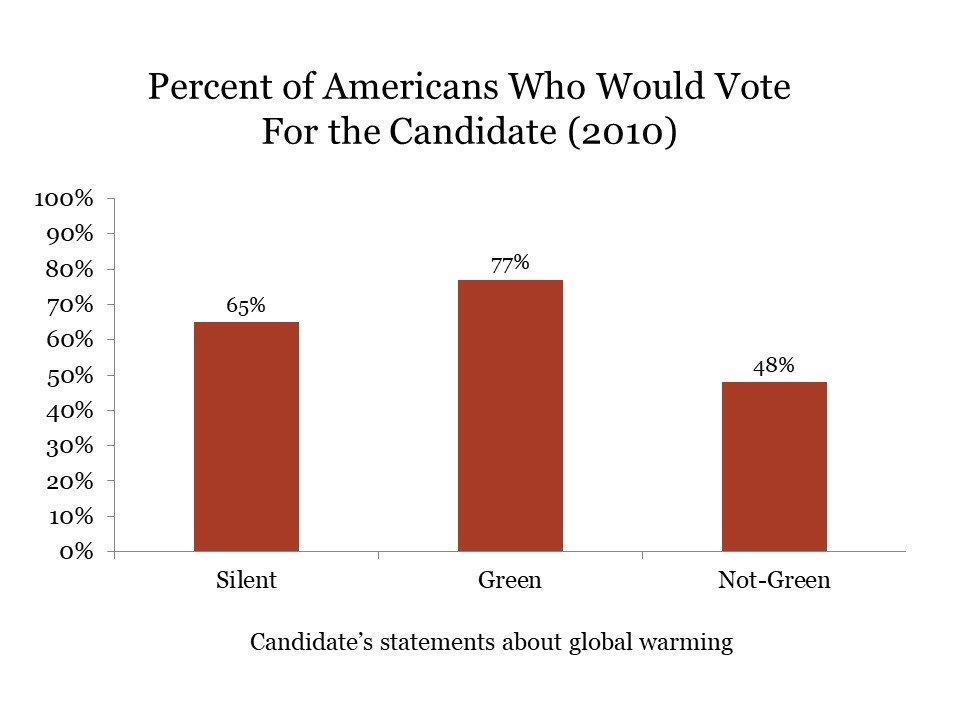Voter Behavior Study 6 – Global Warming And 2010 Hypothetical Senatorial Candidates
Research by the Political Psychology Research Group at Stanford University
Introduction Fundamentals Who Should Take Action Government Policy Economic Side Effects Willingness to Pay Priority Consequences of Global Warming Preparing for Possible Consequences Consumer Choices Attitude Strength Voter Behavior Opinions in the States Trust in Scientists Scientists' Beliefs Partisan Views Publications
Opinion surveys control for external factors that might slant results, but the purest form of ascertaining public opinion is by using randomization. When people go to the polls, or are asked about their voting decisions, they bring all kinds of biases and opinions that may not be captured in an opinion survey on a specific topic such as global warming.
What if people are asked to respond to a hypothetical candidate’s views when there is no election and no extraneous factors that are present in the real world? How do candidates’ views on global warming affect Americans’ likelihood to vote for them?
In a November 2010 survey, Americans revealed how candidate positions on global warming influence their voting choices. They were more likely to choose hypothetical Senate and White House contenders who said global warming was real and needed to be addressed. This was especially true when respondents identified as Democrats or Independents.
Research details:
Respondents in this survey heard interviewers reading position statements from hypothetical candidates. The respondents were randomly assigned to one of three experiences:
- Hearing the interviewers reading hypothetical candidates’ issue positions on two non-climate issues, randomly selected from six statements. This was the control group.
- Hearing the interviewers reading hypothetical candidates’ issue positions on two non-climate issues, randomly selected from six statements, and also one “green” statement on global warming.
- Hearing the interviewers reading hypothetical candidates’ issue positions on two non-climate issues, randomly selected from six statements, and also one ‘not-green’ statement on global warming.
The language used in the statements on climate and global warming came from a combination of sources, including what real candidates had said, and wording used in previous surveys about the topic.
The interviewer asked each respondent to listen to statements, asking,“What if the candidate said the following?” The respondents were asked whether they agreed, disagreed, or neither agreed nor disagreed with the statements they heard.
Then only the people in Group 2 heard the “green” statement:
“Like most Americans and most of the residents of our great state, I believe that global warming has been happening for the last 100 years, mainly because we have been burning fossil fuels and putting out greenhouse gasses. Now is the time for us to stop this by ending our dependence on imported oil and coal to run our cars and heat our houses. We need to begin using new forms of energy that are made in America and will be renewable forever. We can build better cars that use less gasoline. We can build better appliances that use less electricity. And we can make power from the sun and from wind. We don’t have to change our lifestyles, but we do need to reshape the way our country does business. We need to end our long-term addiction to polluting the environment and instead let American genius do what it does best – transform our outdated ways of generating energy into new ones that create jobs and entire industries, and stop the damage we’ve been doing to the environment.”
The not-green statement was read only to those in Group 3:
“There isn’t any real science to say we are changing the climate of the earth. The science on global warming is a hoax and is an attempt to perpetrate a fraud on the American people. Climate science is junk science, and global warming is a manufactured controversy. I don’t buy into the whole man-caused global warming, man-caused climate change mantra, and I believe that there’s not sound science to back that up. We must spend no effort to deal with something that is not a problem at all. Yet that’s exactly what’s happening with the cap and trade bill that Congress has considered. I oppose the cap and trade bill. Cap and trade is a job killer and damages our economy. We should not invest in windmills and solar panels as alternative energy sources. Instead we should continue to focus on our traditional sources of energy: coal, oil, and natural gas. We should expand energy production in our country, including by continuing to mine our coal, doing more drilling for oil here at home.”
Results
Respondents were asked for their electoral preferences. A candidate making a green statement gained 12 additional percentage points, while the not-green candidate lost 17 percentage points (see the figure below). This result suggests that voters do indeed factor in global warming when they evaluate candidates for the purpose of elections.

Survey details:
Abt SRBI interviewed a representative national sample of 1,001 U.S. adults by telephone. Of those, 671 respondents were interviewed on a landline telephone, and 330 were interviewed on a cell phone. Interviews were conducted between Nov. 1 and Nov. 14, 2010, in English and Spanish.